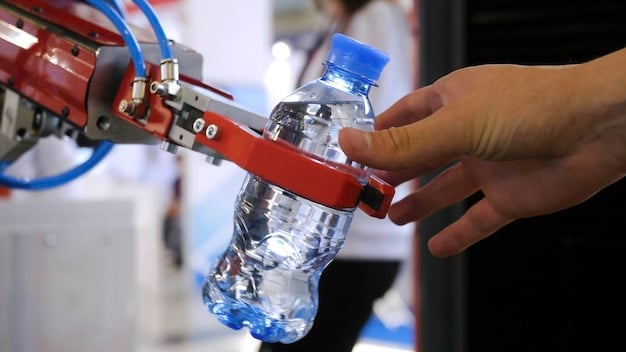US Startups Revolutionize Recycling with AI-Powered Sorting, Boosting Efficiency by 40%

US startups are transforming the recycling industry by implementing AI-powered sorting systems, leading to a significant 40% improvement in efficiency and accuracy compared to traditional methods.
The quest for efficient and effective recycling methods has always been a pressing concern, and **US Startups Revolutionize Recycling with AI-Powered Sorting Systems: A 40% Improvement?** marks a sea of change. These companies are leveraging advanced technology to address the inefficiencies that plague conventional recycling processes and improve how waste is managed.
AI-Powered Sorting Systems: A Game Changer for Recycling
Traditional recycling methods often fall short due to manual sorting errors and the inability to process complex waste streams effectively. However, with recent advancements in artificial intelligence, startups have begun employing AI-powered sorting systems that promise to revolutionize the industry.
These cutting-edge systems use a combination of computer vision, machine learning, and robotics to identify and separate different types of materials with unprecedented accuracy. This not only reduces contamination but also streamlines the recycling process, making it more economically viable.
How AI Enhances Recycling Efficiency
AI dramatically improves the sorting process by accurately identifying and categorizing waste materials. This process offers multiple advantages over manual sorting, leading to higher recovery rates and the ability to process diverse waste streams.
Benefits of Automation in US Recycling Facilities
Several US startups are leading the charge in automation, implementing robotic systems capable of handling high volumes of waste. Benefits include reduced labor costs and increased processing speed.
- Improved Accuracy: AI-driven systems can differentiate materials with remarkable precision.
- Reduced Contamination: Minimizing contamination ensures higher quality recycled materials.
- Increased Throughput: Automation significantly boosts the volume of recyclable materials processed.
- Cost Savings: Automated systems lower dependency on manual labor, thereby reducing operational costs.
In conclusion, the adoption of AI-powered sorting systems represents a significant leap forward in recycling technology. These systems not only enhance efficiency but also address key challenges associated with traditional recycling methods, paving the way for a more sustainable future.
The Role of US Startups in Driving Green Tech Innovations
US startups are at the forefront of green tech innovation, with many focusing on developing AI systems that can handle the complexities of modern waste management. These firms are not just improving existing methods; they are also creating new possibilities for recycling.
The innovative approaches of these companies highlight the potential for technology to address environmental challenges and promote sustainability. By focusing on efficiency, precision, and scalability, these startups are setting new standards for the recycling industry.

Notable US Startups in AI Recycling
Several US startups are making headlines with their innovative approaches to AI-powered recycling. These companies are leveraging cutting-edge technologies to tackle complex environmental problems.
Investment Trends in Green Recycling Technologies
There’s a growing trend of venture capital firms investing in green recycling technologies. The increasing awareness of environmental issues and sustainability drive this investment.
- AMP Robotics: Specializes in AI-powered robotic sorting solutions for waste management.
- Recycle AI: Uses machine learning to improve the accuracy and efficiency of recycling processes.
- Greyparrot: Provides AI-powered vision systems for monitoring and auditing waste streams, enhancing transparency and optimization.
In conclusion, US startups are essential in driving green tech innovations by leveraging AI-powered solutions to improve the efficiency and sustainability of recycling processes. Their efforts are paving the path for a cleaner, more environmentally conscious future.
How AI Sorting Systems Achieve a 40% Improvement in Recycling
One of the most significant achievements of AI sorting systems is their ability to improve recycling efficiency by up to 40%. This boost is attributed to several factors, including increased accuracy, reduced contamination, and optimized processing speeds.
By overcoming the limitations of manual sorting, AI systems ensure that a higher percentage of recyclable materials are recovered and processed effectively. This leads to significant environmental and economic benefits.
Quantifying the Efficiency Gains with AI
Studies and real-world applications indicate that AI sorting systems significantly enhance recycling efficiency. This is reflected in metrics such as reduced waste and higher recovery rates.
Case Studies: Success Stories of AI-Powered Recycling
Several municipalities and recycling facilities have adopted AI sorting systems with remarkable results. Success stories highlight the transformative impact of this technology on recycling operations.

- Eliminating Human Error: AI systems are free of human errors like fatigue, which can lead to inaccurate sorting.
- Handling High Volumes: These systems can efficiently process large quantities of waste materials daily.
- Adapting to New Materials: AI can be trained to identify and sort new types of recyclable materials quickly.
In conclusion, AI sorting systems achieve a notable 40% improvement in recycling by enhancing accuracy, reducing contamination, and optimizing processing speed. These improvements facilitate a more sustainable and economically viable recycling process, setting a new benchmark for the industry.
The Environmental Impact of Enhanced Recycling Processes
The enhanced recycling processes facilitated by AI have a profound impact on the environment. By improving the efficiency and effectiveness of waste management, these systems contribute to reduced landfill waste, conservation of natural resources, and lower greenhouse gas emissions.
The environmental benefits extend beyond waste reduction to include the creation of a circular economy, where materials are reused and repurposed rather than discarded.
Reducing Landfill Waste with AI Recycling
AI recycling significantly reduces the volume of waste sent to landfills. This reduction minimizes environmental pollution and prolongs the lifespan of existing landfill facilities.
Conserving Natural Resources through Efficient Recycling
Efficient recycling helps in conserving natural resources by decreasing the need for virgin materials. This conservation ensures a more sustainable supply chain and reduces environmental exploitation.
Enhanced recycling from the use of AI sorting systems helps with:
- Decreasing Pollution: Less waste in landfills leads to less soil and water contamination.
- Lowering Carbon Footprint: Efficient recycling reduces the energy needed to produce new goods from raw materials.
- Promoting Sustainability: By maximizing the reuse of materials sustainability is promoted and environmental degradation is reduced.
In conclusion, the environmental impact of enhanced recycling processes is substantial, with AI-driven improvements leading to significant reductions in landfill waste, conservation of natural resources, and lower greenhouse gas emissions. These factors highlight the pivotal role of advanced recycling technologies in fostering a more sustainable future.
Challenges and Opportunities in AI-Powered Recycling
While AI-powered recycling presents numerous benefits, it also encounters several challenges, including high initial investment costs, technological integration complexities, and the need for continuous optimization. However, these challenges are met with significant opportunities for innovation and growth in the field.
The ongoing development and refinement of AI technologies promise to overcome existing hurdles and unlock new possibilities for waste management. This requires collaborative efforts from startups, established companies, and government entities.
Overcoming Initial Investment Costs
The high upfront costs of implementing AI-powered recycling systems can be a barrier for many facilities. However, long-term savings and increased efficiency often justify the initial investment.
Technological Integration and Optimization
Integrating AI systems into existing recycling infrastructure requires careful planning and execution. Continuous optimization ensures that the systems adapt to changing waste streams and maintain efficiency.
Despite some issues, the opportunities are big:
- Scalability: AI recycling systems can be scaled to meet the needs of any community or facility.
- Job Creation: Though automation reduces labor, new jobs are created in development, maintenance, and management.
- Data-Driven Insights: AI provides valuable data for improving waste management strategies and policies.
In conclusion, while AI-powered recycling faces challenges such as high initial investment costs and integration complexities, the vast opportunities for innovation, scalability, and data-driven insights make it a promising path forward for creating a more sustainable and efficient waste management system.
The Future of Recycling: What to Expect in the Next Decade
The future of recycling is set to be heavily influenced by advancements in artificial intelligence, robotics, and data analytics. Over the next decade, expect to see more widespread adoption of AI-powered sorting systems, enhanced material recovery rates, and a greater emphasis on creating a circular economy.
These trends will not only transform the recycling industry but also contribute to a more sustainable and environmentally conscious society. Continuous innovation and collaboration will be key to realizing this vision.
Emerging Trends in Recycling Technology
Emerging trends include the use of advanced sensors, blockchain technology for tracking recyclable materials, and AI-driven optimization of recycling processes.
Predictions for AI in Waste Management
Experts predict that AI will become an integral part of waste management, optimizing everything from collection routes to material processing and recovery.
Recycling is adapting:
- Smart Bins: Bins equipped with sensors that sort waste on the spot.
- Advanced Material Recovery: Technologies to extract rare earth elements from e-waste.
- Policy Changes: Governments worldwide adapting policies to promote recycling and ban single-use plastics.
In conclusion, the future of recycling will be shaped by continuous innovation in AI, robotics, and data analytics, leading to enhanced material recovery, widespread adoption of AI-powered systems, and a stronger commitment to creating a circular economy. These developments promise a more sustainable and environmentally responsible approach to waste management.
| Key Aspect | Brief Description |
|---|---|
| 🤖 AI Sorting | Uses AI to accurately identify and sort waste materials. |
| 📈 Efficiency | Improves recycling efficiency by up to 40%. |
| 🌱 Environment | Reduces landfill waste and conserves natural resources. |
| 💰 Investment | Attracts venture capital, driving green tech innovation. |
Frequently Asked Questions
▼
AI systems use computer vision and machine learning to accurately identify and sort different types of waste materials, reducing human error and contamination.
▼
Key benefits include increased efficiency, reduced contamination, lower labor costs, and the capacity to handle a larger volume of recyclable materials.
▼
AI promotes environmental sustainability by reducing landfill waste, conserving natural resources, and lowering greenhouse gas emissions through efficient recycling processes.
▼
Notable startups include AMP Robotics, Recycle AI, and Greyparrot, each providing unique AI-powered solutions to enhance and optimize recycling processes.
▼
Future trends include the wider adoption of smart bins, enhanced material recovery technologies, and government policies that actively promote recycling innovation and sustainability.
Conclusion
In conclusion, US startups are spearheading a transformative shift in the recycling industry through the implementation of AI-powered sorting systems. These innovations are not only enhancing efficiency and accuracy but also paving the way for a more sustainable and environmentally conscious future. As technology continues to advance, the widespread adoption of AI in recycling promises to revolutionize waste management and contribute to a cleaner, healthier planet.





